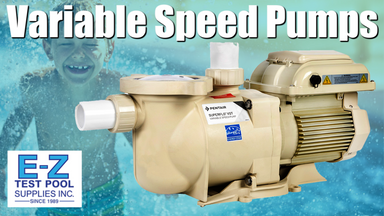Published by Matt Fichera on 03/27/2020
New Energy Efficiency Regulations and What They Mean for Pool Pumps
Did you know that swimming pool pumps are usually the number two consumer of electricity in the entire household? After heating and cooling, the pool pump accounts for 13% of your entire monthly energy use.
So, what exactly is the new regulation? The U.S. Government is saying that all pool pumps that are both manufactured for use or imported for use after July 19, 2021 must meet new efficiency standards. This blog will explain some of these new regulations and what they mean for the pool owner.
Also, be sure to read our NH Saves Rebate Program Blog on how to get money back on the purchase of your new pump.
What has typically been referred to as an inground swimming pool pump will be classified as self-priming. Within this new category there will be pumps classified as either large or small and each of these will have different requirements when it comes to energy efficiency.
Large – Classified as 1 horsepower or larger that are self-priming. A variable speed pump will be the only pump model available today that will meet the minimum performance based on the current technology.
Small – Classified as 0.5 horsepower and .75 horsepower. Single speed or two-speed pumps will all have to meet requirements on efficient power consumption. It should be noted here that the majority of all of the existing single speed pumps will not meet the newest minimum requirements.
What has been referred to in the past as an above ground pump will be classified as a non-self-priming pump. The latest regulations on these will be less strict than inground but will be increase nonetheless. Above ground filter pumps or non-self-priming that are single speed or two-speed and are labeled as energy efficient should have no problem meeting the guidelines being put in place.
Booster Pumps for pressure cleaners are also getting new minimum performance requirements. All pumps that are labeled as “high efficiency single-speed” or “energy efficient” will meet the minimum standards being put in place.
Other pumps such as waterfall pumps, filter pumps with sand or cartridge integration used in small inflatable pools, and electric spa pumps for permanent and storable are excluded and will not be receiving minimum performance requirements.
There are some exemptions on these upcoming regulations. These exemptions include three phase pumps, electric spa pumps and pumps that are greater than 5 total horsepower. All of these things do not have minimum DPPP efficiency standards.
Maybe, at this point, you’re thinking that you’ll have to replace the installed base of non-compliant pumps that you own and are already in use? The answer to this question is “No”. The regulations will not require that you bring all pumps in use up to compliance levels, only in the future when the pump is replaced will it need a replacement that’s compliant.
Let’s use an example: What would happened when a single-speed pump that’s already in use fails after July 19 th 2021? Can it still be replaced with a new single-speed pump? The answer to this question will depend on how the pump being replaced is classified. If it’s a large-self priming pump the answer is no and you will need to upgrade to a variable speed pump. If the pump being replaced is a non-self-priming or a small self-priming pump then a single-speed energy efficient replacement may be an option.
As a part of these new regulations, there’s some new terms/definitions and labeling requirements.
WEF (Weighted Energy Factor) This term is a measurement that is used to classify the energy efficiency of a pump. It’s calculated by taking the amount of water is pumped divided by how much energy it takes to pump that same water. The measurement is fairly similar to miles per gallon in an automobile. The higher the WEF number the more efficient the pump. As part of the new regulations, each pump must have its WEF printed on it.
HHP (Hydraulic Horsepower) This term refers to the amount of hydraulic power that is created by the wet end of the pump.
THP (Total Horsepower) or SFHP (Service Factor Horsepower) This is the new pump HP rating and is determined by the total HP created at the motor shaft. This number also needs to be clearly labeled on the pool pump.
So, what does all of this mean for a pool owner?
- Home energy use will be decreased with high efficiency pumps replacing older technology.
- Information pertaining to swimming pool pump performance needs to be clearly labeled on the exterior of the pump.
- A potential reduction in monthly electrical charges and overall carbon footprint.
Purchase a New Variable Speed Pump and Get a Rebate!
Many states have a rebate program where a portion of the money that is used to purchase your high efficiency variable speed pool pump is then reimbursed to you via the mail. Check out our blog on this right here: https://www.eztestpools.com/blog/nh-saves-big-with-energystar/ or go directly to the NH Saves Pump Rebate Program at: https://nhsaves.com/rebates/pool-pumps/
Variable Speed Pool Pumps from E-Z Test Pool Supplies
Take a look at all of our variable speed pool pumps at: https://www.eztestpools.com/variable-speed-pumps/ This includes the Speck Model E71-II VHV which is the only Above Ground Variable speed pump on the market today! If you have any questions on swimming pool pumps, the rebate program, or anything else, please contact us today! We'd be happy to help.







